20+ Signs Of Sleep Apnea You Shouldn’t Ignore
My cousin Jake kept falling asleep during our weekly game nights, which was strange for someone who lived on energy drinks and enthusiasm. One evening, while he dozed off mid-Monopoly, I noticed something alarming – his breathing would stop for seconds at a time, followed by loud gasps that made everyone jump. As a sleep wellness consultant, I recognized these signs immediately.
After some gentle nudging (and promises to let him win at Monopoly), I convinced him to see a sleep specialist. Turns out, Jake had sleep apnea. Who knew those thunderous snores that rattled his apartment walls weren’t just a quirky trait?
Now, after proper treatment, he’s back to his energetic self, crushing us all at board games. His experience taught me that sleep apnea signs aren’t always obvious, but they’re crucial to spot. These 20+ warning signals might help you identify if you or someone you care about is dealing with more than just ordinary sleep troubles.
What’s Sleep Apnea
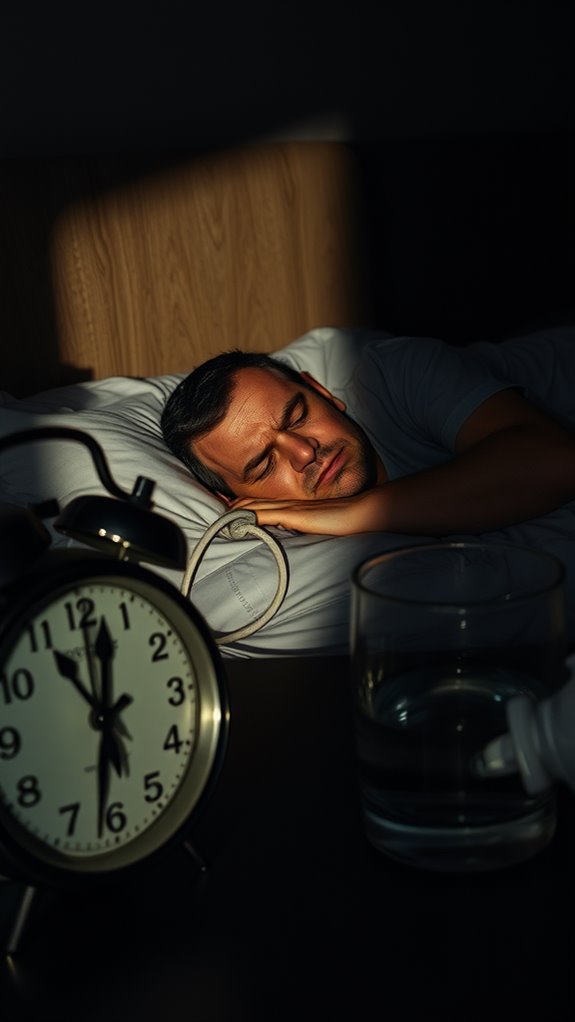
When it comes to understanding sleep apnea, it might feel like trying to solve a puzzle with a few missing pieces.
This sleep disorder sneaks in with symptoms of sleep apnea that often go unnoticed, especially in obstructive sleep apnea cases.
If you’re juggling risk factors like obesity or aging, untreated sleep apnea could lead to serious health issues. Higher rates of sleep apnea are observed in men over 40 and women aged 30-60 who are overweight.
Time to connect those dots!
The Different Types of Sleep Apnea
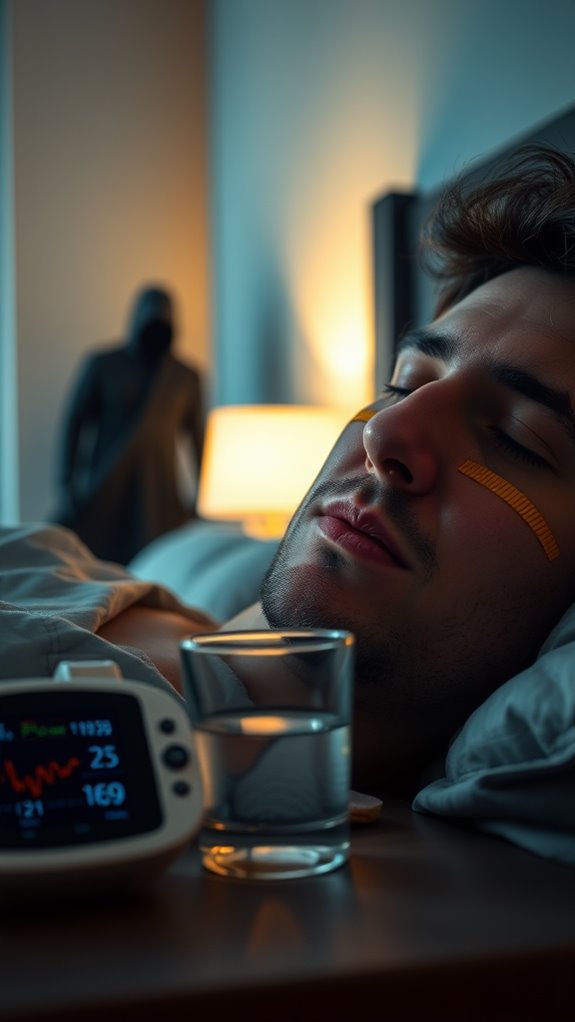
Sleep apnea isn’t just a one-size-fits-all kind of deal; it’s more like a buffet of breathing issues.
You’ve got obstructive sleep apnea, where your throat muscles throw a party and block your airway.
Then there’s central sleep apnea, where your brain hits the snooze button on breathing.
Finally, complex sleep apnea mixes both.
A sleep specialist can help you sort through these symptoms of sleep apnea! Quality sleep is essential for overall health maintenance, so addressing sleep apnea promptly is crucial for your well-being.
Loud Snoring: A Common Symptom
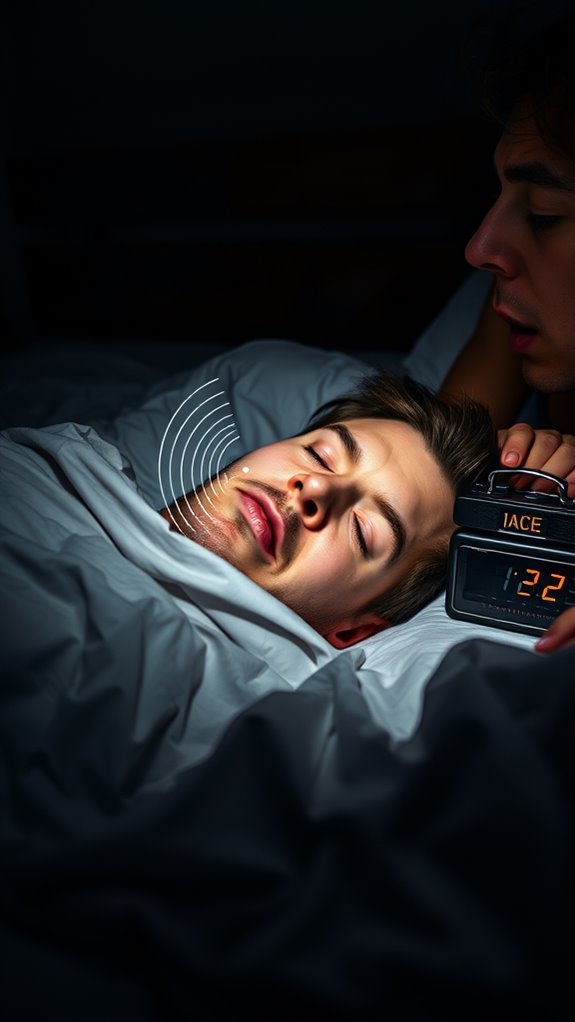
Loud snoring can feel like a nightly concert, and trust me, it’s not the kind you want front-row seats to!
This type of snoring often signals obstructive sleep apnea, with irregular bursts and breathing pauses that can wake your partner.
If you notice these symptoms of sleep apnea, don’t ignore them—after all, undiagnosed sleep apnea affects millions, and you don’t want to be one of them!
Gasping or Choking During Sleep
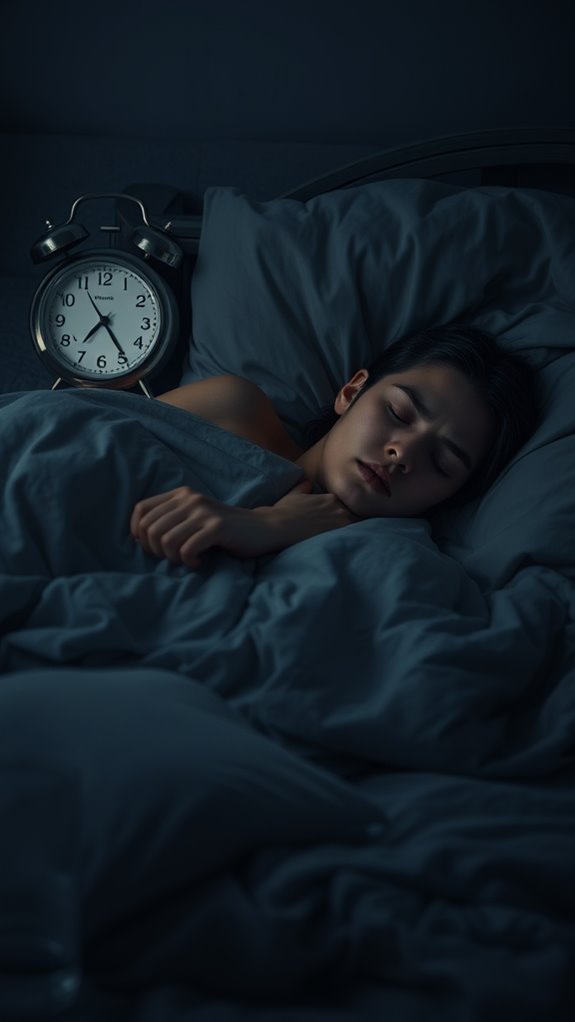
Ever found yourself jolted awake in the middle of the night, feeling like you just ran a marathon? Those gasping or choking sounds could signal obstructive sleep apnea. These interruptions not only ruin your sleep but also pose serious health risks. Recognizing symptoms early is crucial. Here’s a quick overview:
| Symptom | Duration | Impact |
|---|---|---|
| Gasping or Choking | 10 seconds+ | Interrupts restorative sleep |
| Loud Snoring | Intermittent | Partner’s sleep disruption |
| Health Risks | Long-term | Cardiovascular issues |
Excessive Daytime Sleepiness
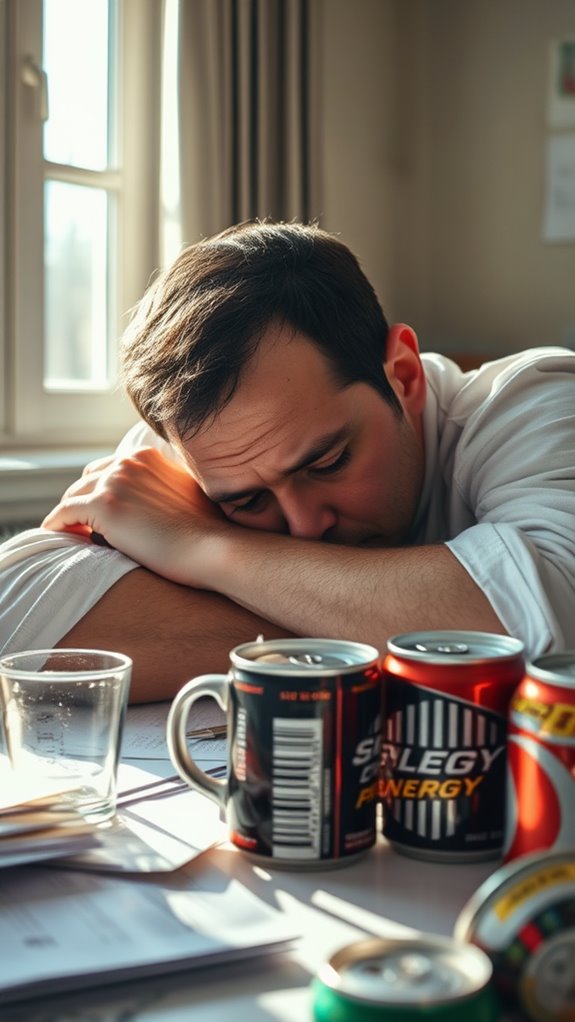
Imagine trudging through your day like a zombie straight out of a horror movie, all thanks to excessive daytime sleepiness. It’s like trying to function with one eye closed! Sleep apnea disrupts my sleep cycles, denying me that precious restorative rest. I feel its grip on my quality of life, leaving me with impaired alertness and a constant battle against drowsiness. In fact, after just 24 hours without adequate sleep, cognitive and behavioral changes can resemble 0.10% blood alcohol concentration, amplifying the struggle to stay awake and focused.
Morning Headaches
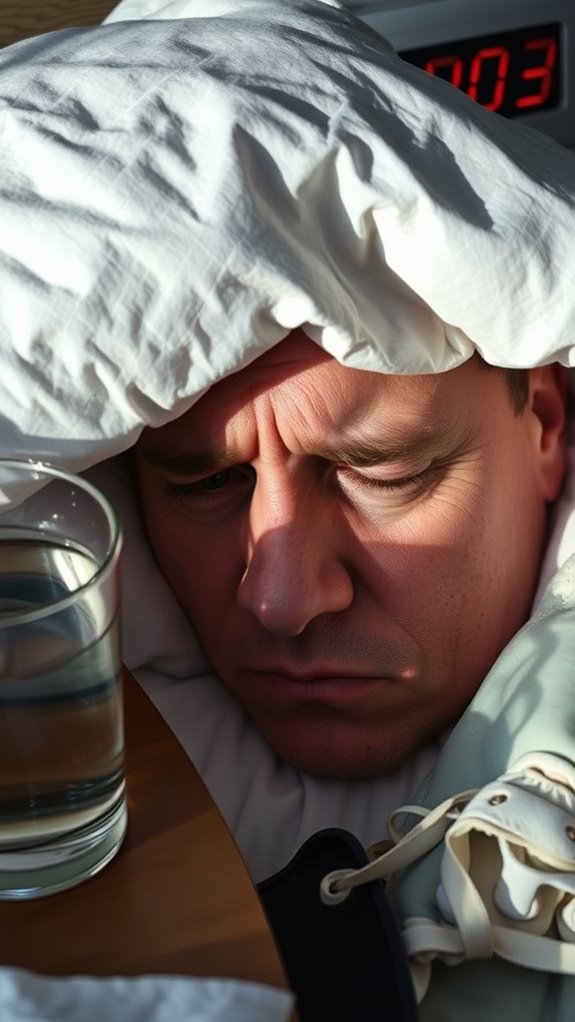
Waking up with a dull, throbbing headache can feel like being hit by a freight train right after a night of restless sleep. If you’re experiencing morning headaches, it could be a common symptom of sleep apnea. Recognizing the symptoms early is crucial, as these headaches might signal underlying health problems that need addressing—don’t just reach for pain relievers; dig deeper! Additionally, excessive daytime sleepiness is a primary symptom often associated with sleep apnea, highlighting the need for proper evaluation.
Dry Mouth or Sore Throat in the Morning
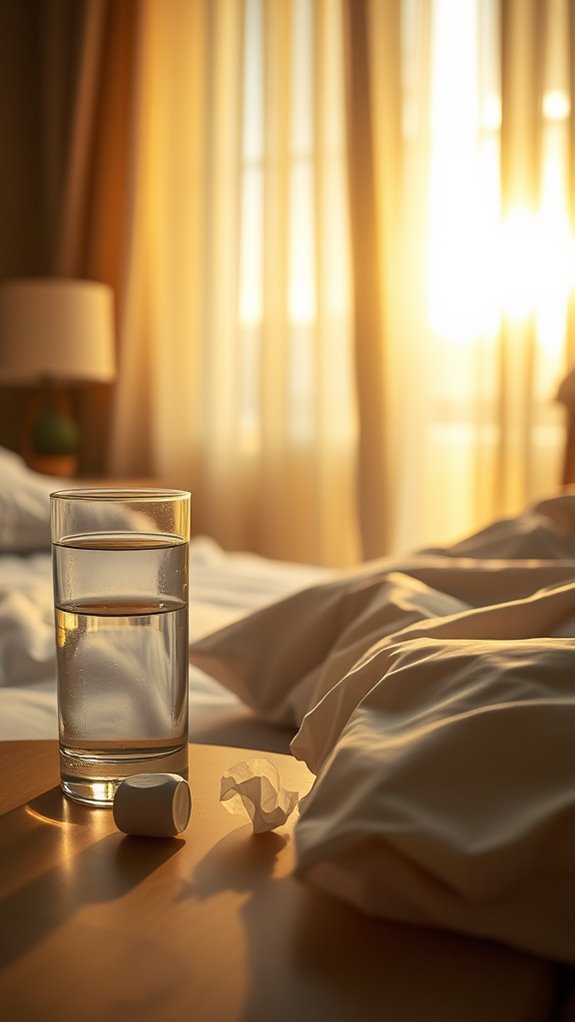
If you’ve found yourself grimacing at the taste of cotton in your mouth or feeling like you’ve just chewed on a handful of sandpaper when you wake up, you might be dealing with more than just a rough night’s sleep.
Here are three signs sleep apnea might be the culprit:
- Constant dry mouth.
- Persistent sore throat.
- Breathing interruptions during the night.
Ignoring these could lead to serious health risks!
Difficulty Concentrating

After tossing and turning all night, you might start your morning with a mouth that feels like it’s been marinated in sand, but that’s not the only downside of sleep apnea. Difficulty concentrating is a real bummer. Excessive daytime sleepiness leaves you struggling, and fragmented sleep just compounds the cognitive impairment. Here’s a quick look:
| Symptoms | Effects on Focus | Long-term Consequences |
|---|---|---|
| Difficulty Concentrating | Decreased productivity | Cognitive decline |
| Excessive Daytime Sleepiness | Lapses in attention | Poor decision-making |
| Fragmented Sleep | Impaired memory consolidation | Overall mental dullness |
To combat these effects, it’s crucial to establish a consistent sleep routine that promotes better sleep quality.
Mood Swings and Irritability
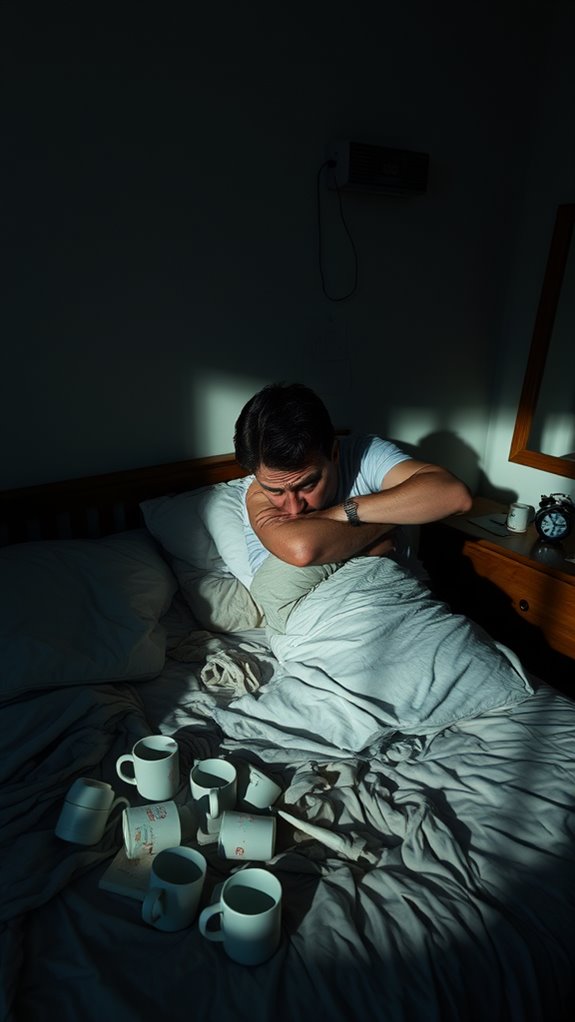
You mightn’t realize it, but your mood can take a nosedive faster than a mattress on a bumpy road when sleep apnea crashes your slumber party.
Those mood swings and irritability? Here’s what to watch for:
- Disrupted sleep patterns.
- Fluctuating emotional well-being.
- Chronic feelings of frustration.
If you think sleep apnea’s messing with your head, it’s time to seek help!
Increased Blood Pressure
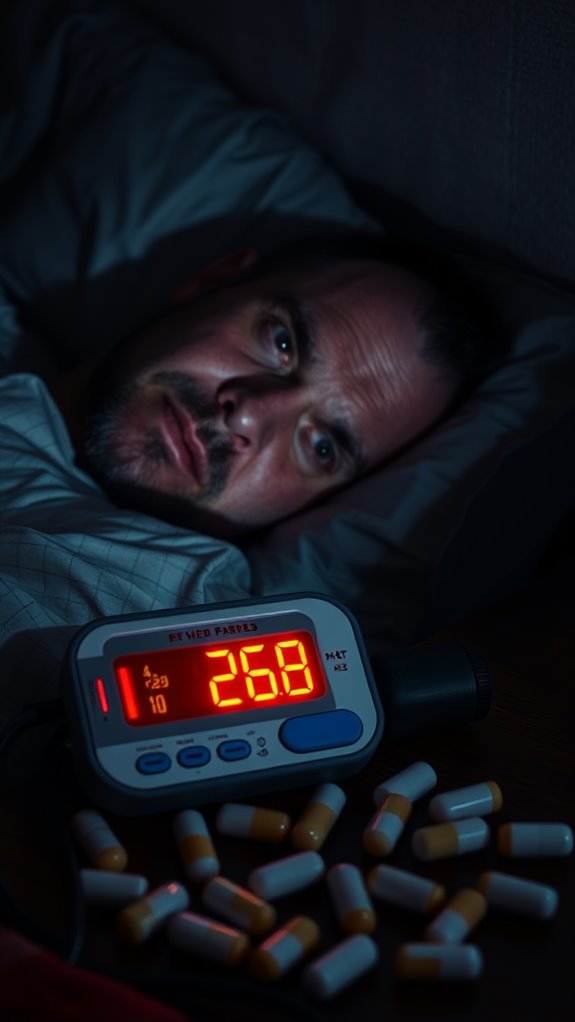
While we all know that a good night’s sleep is crucial for feeling like our best selves, sleep apnea can throw a wrench in that plan, leading to an unwelcome spike in blood pressure.
Untreated sleep apnea isn’t just a nuisance; it can send your blood pressure soaring, increasing your risk of hypertension and threatening your cardiovascular health.
Don’t let snoring steal your peace!
Night Sweats
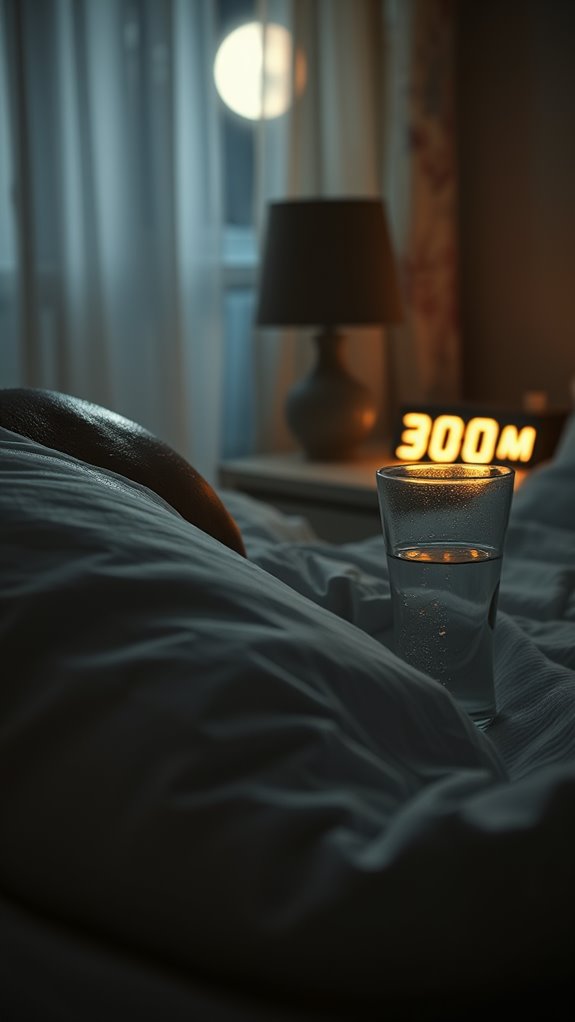
Envision this: you’re nestled comfortably in your bed, dreaming sweetly, when suddenly, you wake up drenched in sweat, feeling like you’ve just completed a marathon in your sleep.
Night sweats can signal:
- Oxygen deprivation during sleep.
- Disrupted sleep quality.
- Increased daytime drowsiness.
If this sounds familiar, it might be time to consult a healthcare provider about a possible sleep disorder.
Sleep Disturbances and Fragmented Sleep
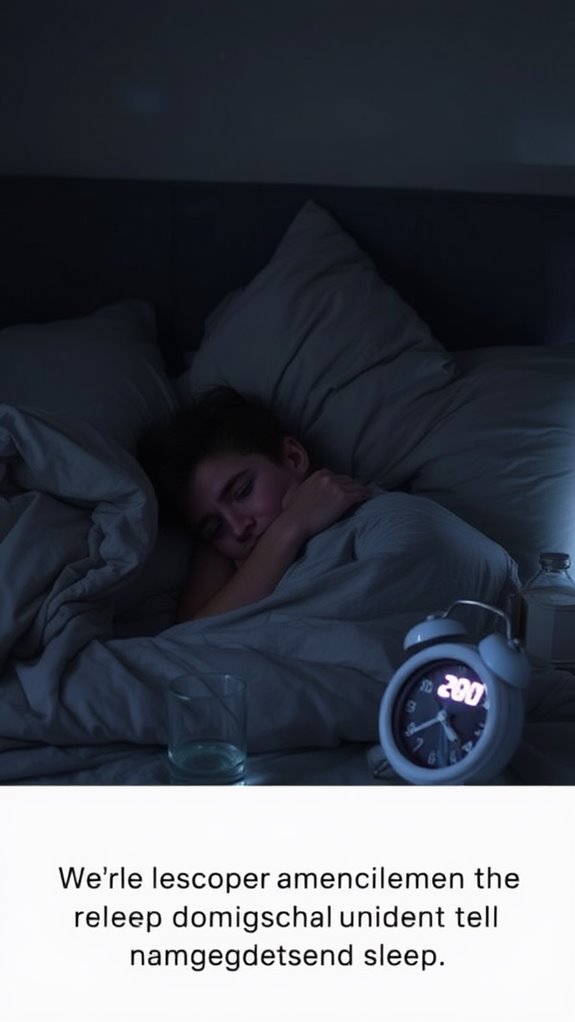
When sleep feels like a game of whack-a-mole, with your breathing pauses popping up at the most inconvenient times, it’s easy to see how sleep disturbances can turn a cozy night into a chaotic experience.
These fragmented sleep cycles rob you of deep restorative sleep, leaving you with excessive daytime fatigue and a foggy brain.
Trust me, it’s not the refreshing rest you signed up for!
Memory Issues and Cognitive Decline
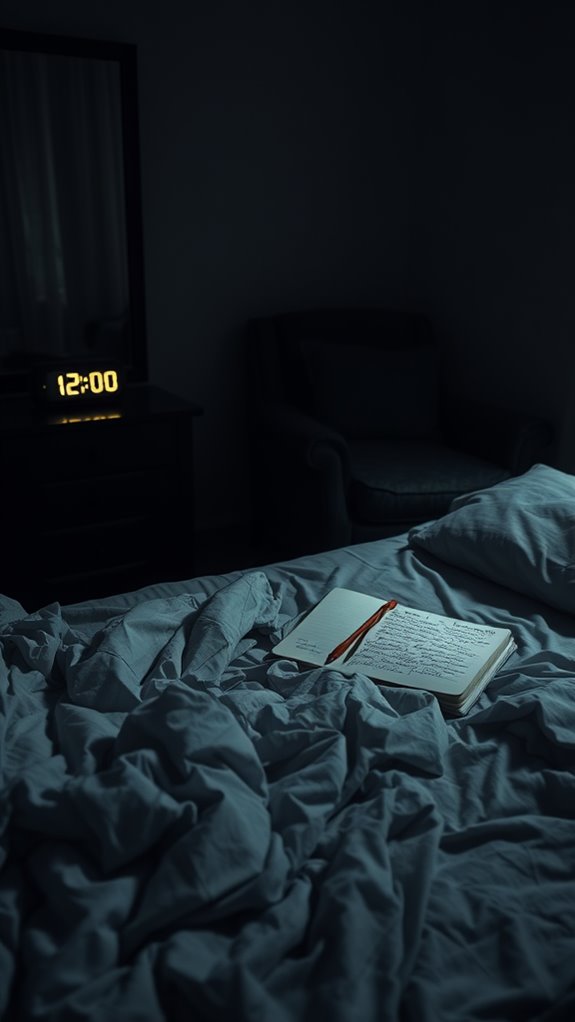
Sleep apnea doesn’t just mess with your nights; it can also turn your brain into a foggy mess during the day.
It’s like trying to run a computer with too many tabs open. Here are three signs you might notice:
- Memory issues that make you forget names.
- A decline in cognitive performance.
- Difficulty focusing on simple tasks.
Treating untreated sleep apnea can clear the fog!
Fatigue Despite Adequate Sleep
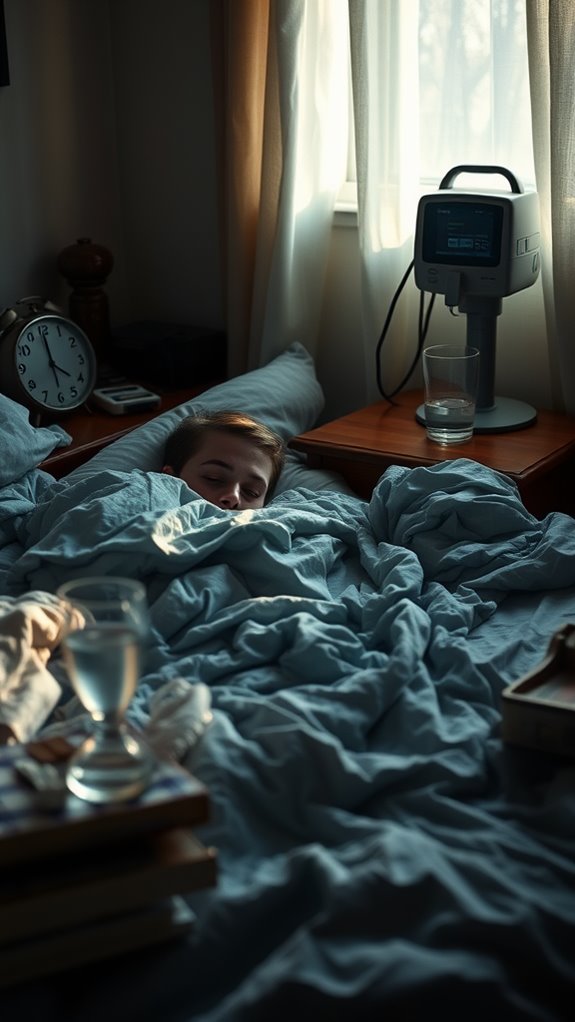
Waking up feeling like you’ve just run a marathon, despite a full night of sleep, can be downright baffling.
I mean, how can I feel so fatigued? Those pesky sleep apnea episodes disrupt my sleep and leave me battling daytime drowsiness.
It’s like my brain’s on a coffee break while my overall quality of life takes a nosedive.
I need answers!
Increased Frequency of Nighttime Bathroom Trips
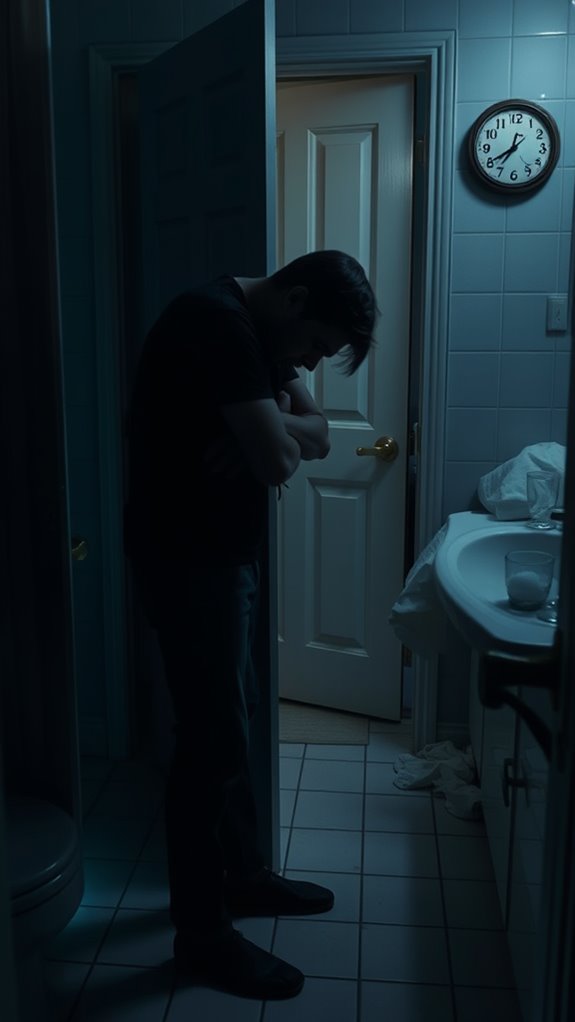
It’s like clockwork; just as I’m finally drifting into that blissful dreamland, my bladder decides it’s time for an encore performance.
This increased frequency of nighttime trips, or nocturia, often ties back to sleep apnea and disrupted sleep.
Here are a few things to consider:
- Awakenings from deep sleep
- Potential prostate issues
- Treatment options like CPAP
Improving my sleep quality could be the key!
Partner Observations of Breathing Pauses
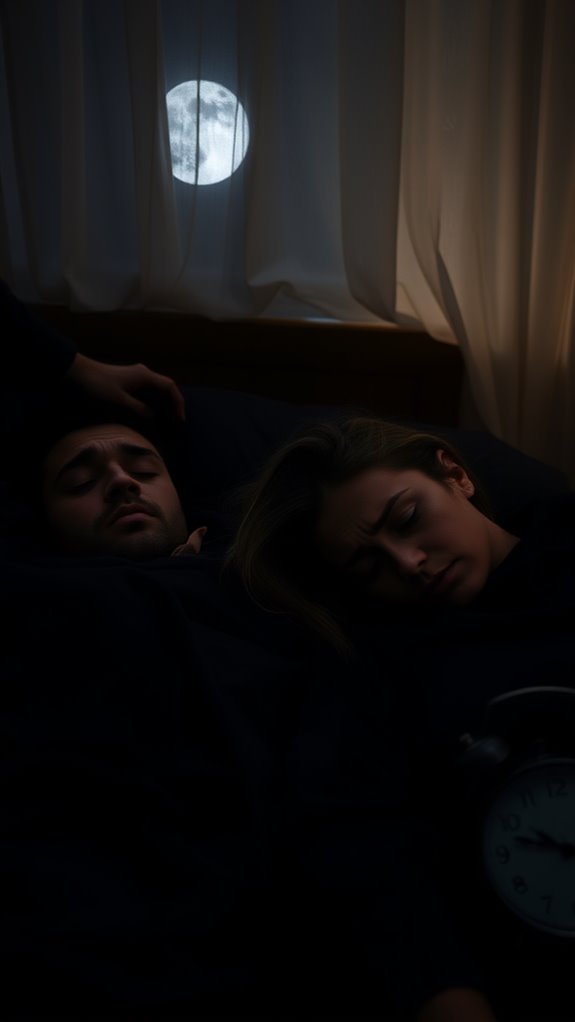
When you’re nestled under the covers, drifting off to sleep, the last thing you expect is your partner’s breathing to suddenly turn into a dramatic performance worthy of an Oscar.
If you’re hearing loud snores interrupted by eerie silences, take note!
These signs of sleep apnea could lead to a diagnosis and treatment that might just banish their daytime fatigue for good.
Low Energy Levels Throughout the Day
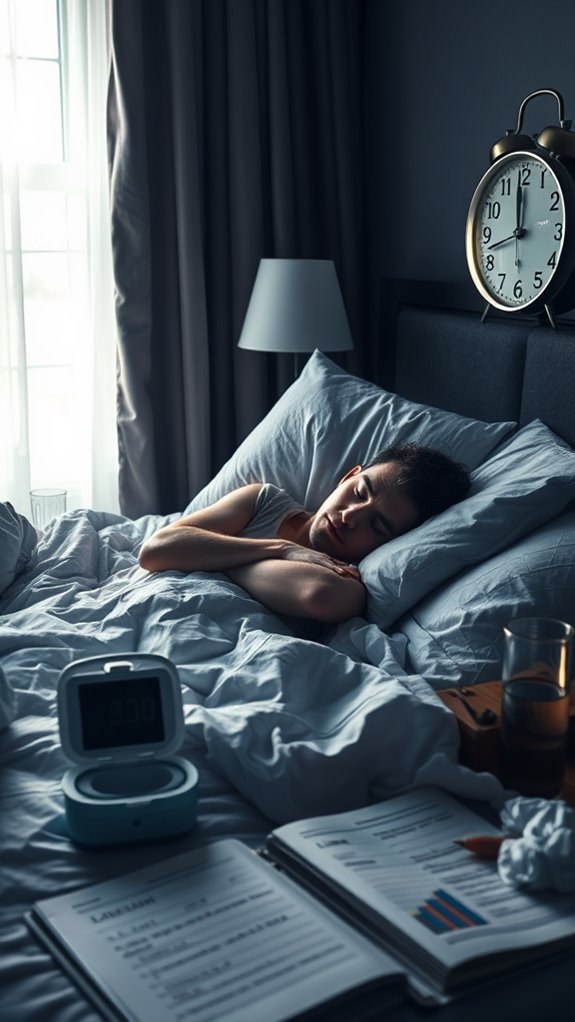
Imagine dragging yourself through your day like a zombie in a low-budget horror flick—eyes half-closed, coffee in hand, and a perpetual yawn ready to escape your lips.
If you’re experiencing low energy levels, consider:
- Excessive daytime sleepiness.
- Ongoing fatigue despite hours of sleep.
- A decline in your quality of life.
Sleep apnea might be the culprit, leaving you feeling like a tired ghost.
Frequent Waking During the Night
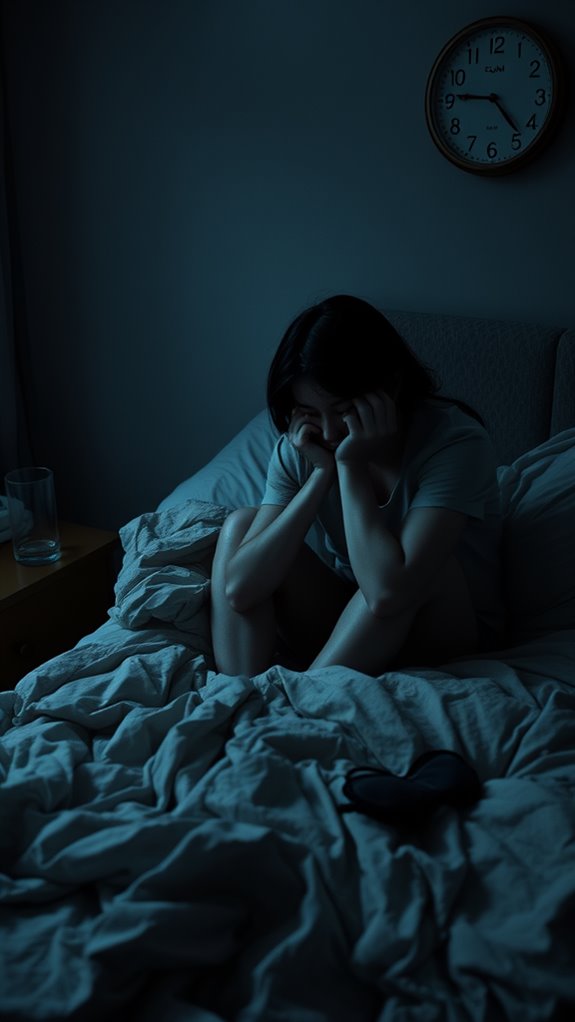
Waking up in the middle of the night can feel like getting yanked from a cozy dream into the harsh spotlight of reality, and trust me, it’s not the kind of encore anyone wants.
Frequent waking can be a sign of sleep apnea, leading to nighttime awakenings that leave you battling daytime fatigue and potential health issues.
Don’t ignore those interruptions; they matter!
Choking Sensations Upon Waking
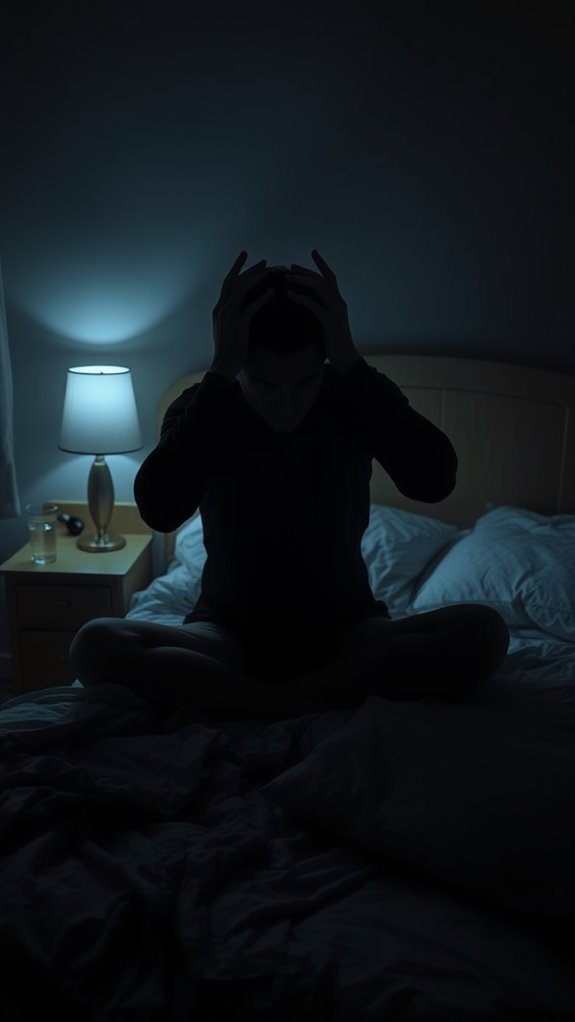
Choking sensations upon waking can feel like a surprise guest crashing your slumber party, and trust me, it’s not the kind of company you want.
If you’re experiencing this, consider that it might indicate obstructive sleep apnea.
Watch for these signs:
- Breathing interruptions
- Excessive daytime sleepiness
- Serious health consequences
Ignoring these clues could lead to more than just a restless night!
Feeling Restless or Agitated at Night
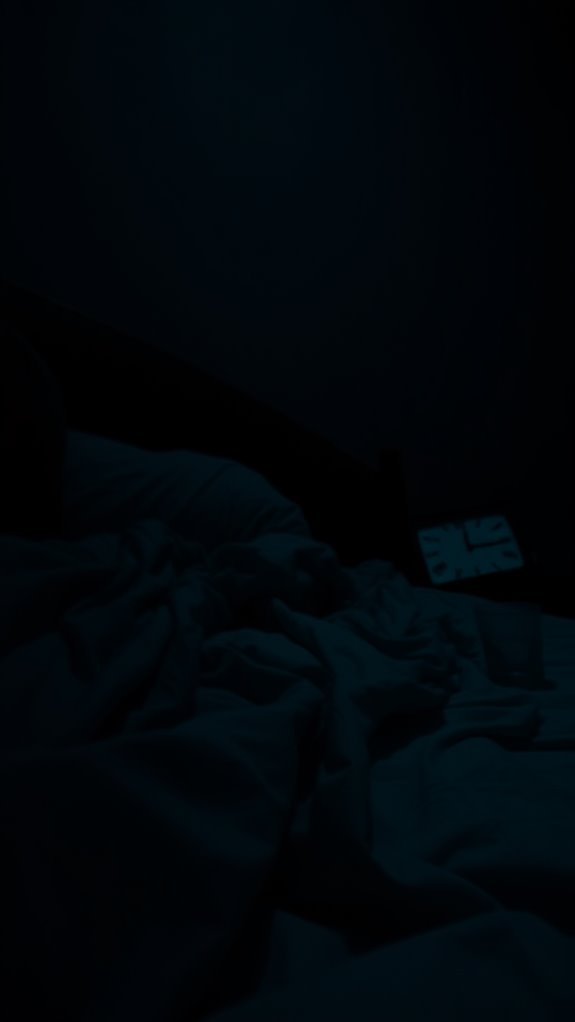
After a night of struggling with choking sensations, you might find yourself feeling a bit like a restless octopus trying to find comfort in a too-small bed.
Those nighttime disturbances from sleep apnea leave you tossing and turning, battling excessive daytime fatigue.
It’s a vicious cycle of fragmented sleep that makes you feel agitated and unrested.
Trust me, I get it!
Loss of Interest in Daily Activities

When the joy of your favorite hobbies starts to feel as distant as a unicorn in a desert, it’s time to take a closer look at what might be sapping your enthusiasm.
Consider these signs:
- Excessive daytime fatigue makes you feel sluggish.
- Cognitive impairments steal your focus.
- Untreated sleep apnea can trigger a serious loss of interest.
Early detection is key!
Increased Risk of Accidents and Injuries
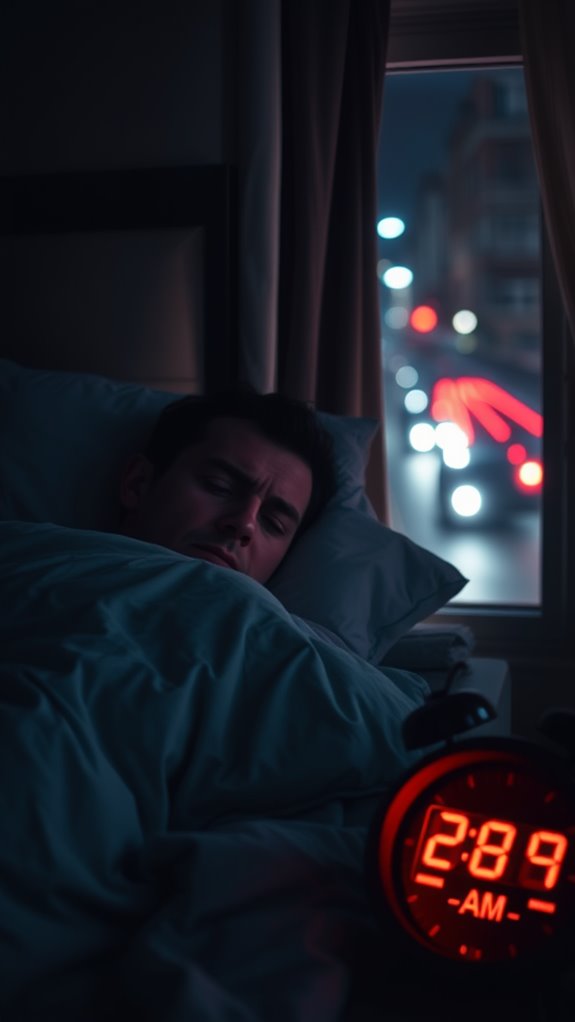
Sleep apnea may seem like a pesky little nuisance, but it can turn your daily life into a game of Russian roulette—without the fun.
Imagine driving while battling daytime drowsiness, your impaired functioning akin to being tipsy. Untreated sleep apnea heightens your risk of accidents, leaving you vulnerable to workplace mishaps or worse.
Ignoring the signs isn’t just reckless; it’s downright dangerous.
Family History of Sleep Disorders
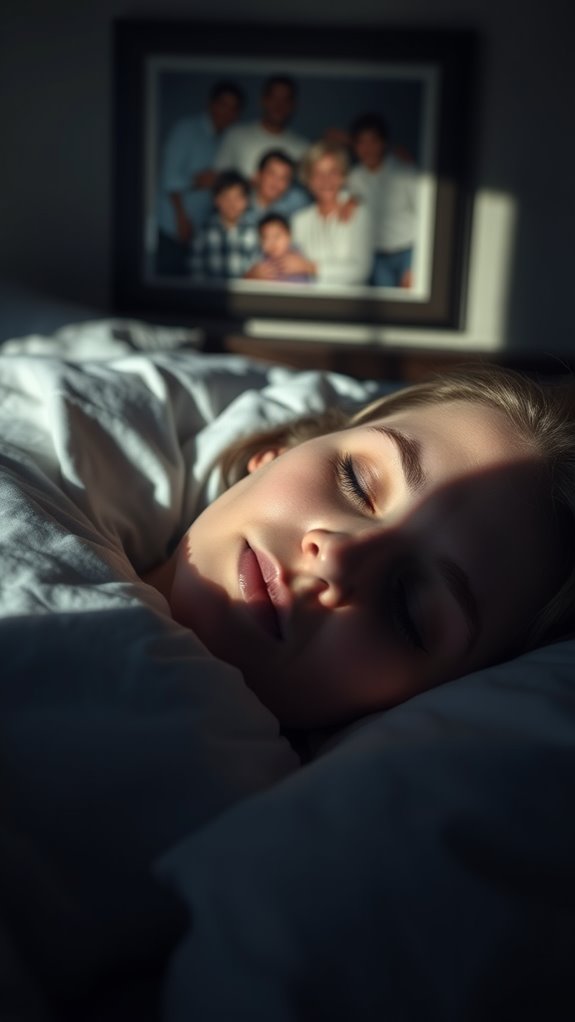
If you’ve ever found yourself tossing and turning at night, wondering if you’re destined to join the family tradition of sleep troubles, you’re not alone.
A family history of sleep disorders can mean:
- Increased risk of obstructive sleep apnea.
- Greater likelihood of severe symptoms.
- Elevated health risks overall.
Staying aware of these factors can help you catch those pesky symptoms early!
Difficulty Falling or Staying Asleep
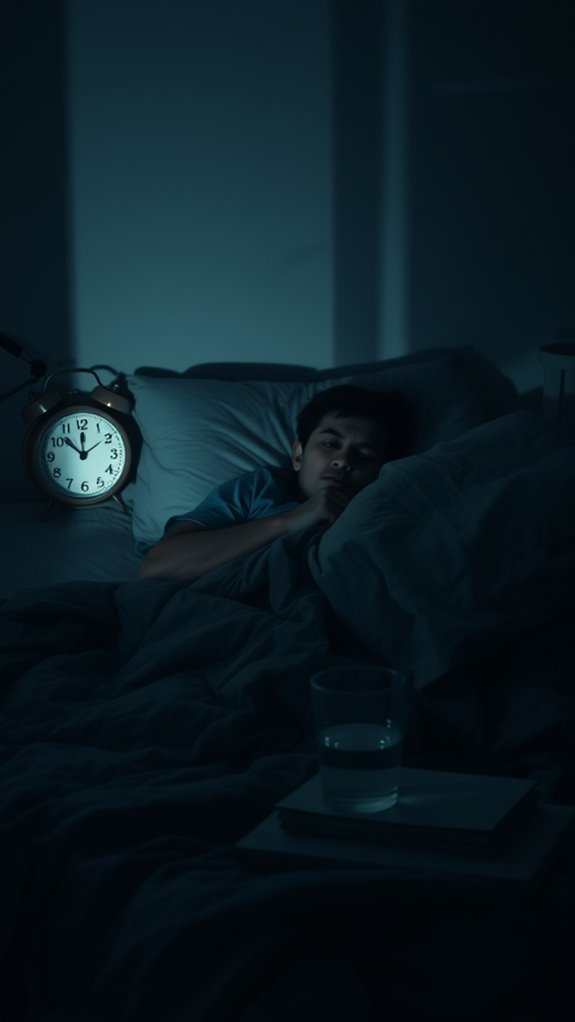
Tossing and turning in bed can feel like being trapped in a never-ending game of musical chairs, where the music stops, and you’re left standing with nowhere to go.
I’ve had my share of difficulty falling asleep, disrupted sleep patterns, and those pesky sleep apnea symptoms.
Insomnia feels like a cruel joke, stealing away my chance for restorative sleep each night.
Seeking Medical Help for Symptoms
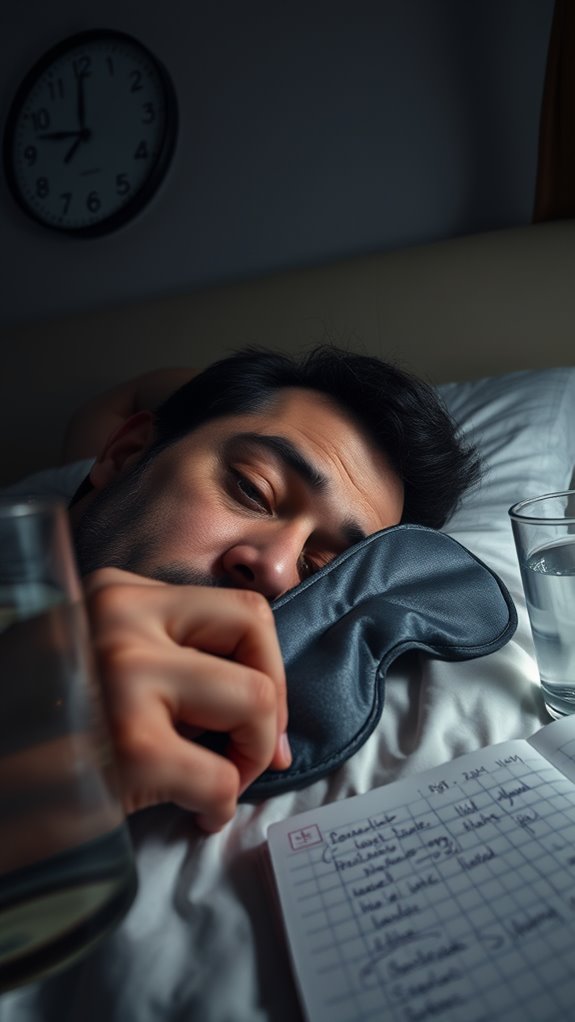
When the morning light streams through the window and I’m still fighting the urge to hit snooze for the fifth time, it’s a clear sign something’s amiss.
If you notice these signs, don’t hesitate to seek medical help:
- Excessive daytime fatigue
- Loud snoring with gasping
- Morning headaches
Ignoring these symptoms could jeopardize your health.
Treatment for sleep apnea can change everything!
Frequently Asked Questions
What Are the Weird Symptoms of Sleep Apnea?
I’ve noticed some strange symptoms of sleep apnea, like waking up feeling disoriented, experiencing vivid dreams, and even having sudden mood swings. These odd signs can really impact my daily life and overall well-being.
What Happens if I Ignore My Sleep Apnea?
If I ignore my sleep apnea, I’m risking serious health issues like heart disease and stroke. Chronic fatigue can affect my daily life, leading to mood swings and cognitive problems I definitely don’t want to deal with.
What Is the Most Serious Presenting Symptom of Sleep Apnea?
The most serious presenting symptom of sleep apnea, in my experience, is excessive daytime sleepiness. It’s frustrating and can really disrupt my daily life, making me feel tired and less alert during important moments.
What Should You Not Do if You Have Sleep Apnea?
If I have sleep apnea, I wouldn’t ignore my symptoms, skip follow-ups, or rely on over-the-counter aids. I’d also avoid alcohol before bed and focus on weight management to improve my condition.
In Conclusion
Sleep apnea signs range from loud snoring and daytime fatigue to morning headaches and difficulty concentrating. These symptoms can seriously impact your daily life and overall health. Getting proper medical attention early helps prevent complications like heart problems and high blood pressure.
Don’t wait to address sleep apnea symptoms. Schedule an appointment with your healthcare provider for a proper evaluation and diagnosis. Treatment options exist, from lifestyle changes to CPAP devices, which can help you restore healthy sleep patterns and improve your quality of life.





